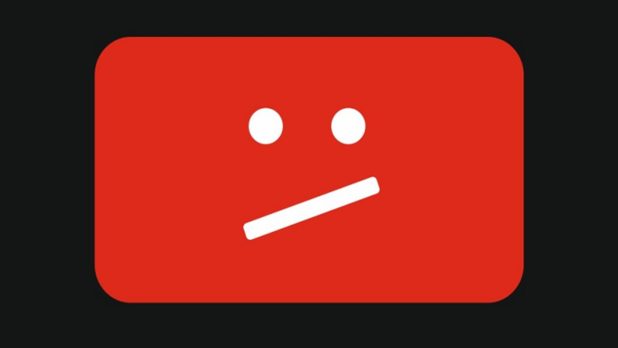Adrian Sol
Daily Stormer
February 18, 2020
Sorry goyim, we’re gonna have to shut all your videos and comments down. Can’t be having all this hate in these tubes.
The best thing about being a social science research professor is that you can pretty much just make up anything you want and support it with any random shoddy methodology and no one is likely to ever call you out on it – as long as your results support the status quo.
In the harder sciences, like physics and chemistry, if researchers start making things up, then no matter how much institutional support they might have, it’ll be quite obvious that something is wrong when people see that the math doesn’t add up and the predictions don’t match physical phenomena.
But in the hands of a sociology or psychology professor, things like numbers or statistics become akin to molding clay, things they can shape to their heart’s content.
For example, they can examine YouTube’s censorship history and conclude that the website isn’t biased in any way against the right-wing.
In August 2018, President Donald Trump claimed that social media was “totally discriminating against Republican/Conservative voices.” Not much was new about this: for years, conservatives have accused tech companies of political bias. Just last July, Senator Ted Cruz (R-Texas) asked the FTC to investigate the content moderation policies of tech companies like Google. A day after Google’s vice president insisted that YouTube was apolitical, Cruz claimed that political bias on YouTube was “massive.”
But the data doesn’t back Cruz up—and it’s been available for a while. While the actual policies and procedures for moderating content are often opaque, it is possible to look at the outcomes of moderation and determine if there’s indication of bias there. And, last year, computer scientists decided to do exactly that.
Is that so?
Allow me to doubt that in the strongest possible way.
Motivated by the long-running argument in Washington DC, computer scientists at Northeastern University decided to investigate political bias in YouTube’s comment moderation. The team analyzed 84,068 comments on 258 YouTube videos. At first glance, the team found that comments on right-leaning videos seemed more heavily moderated than those on left-leaning ones. But when the researchers also accounted for factors such as the prevalence of hate speech and misinformation, they found no differences between comment moderation on right- and left-leaning videos.
In other words, YouTube is definitely censoring right-wing comments in a completely obvious way, but it doesn’t actually count as censorship because those comments are hateful and wrong.
Naturally, the comments are hateful and wrong according to the left.
“There is no political censorship,” said Christo Wilson, one of the co-authors and associate professor at Northeastern University. “In fact, YouTube appears to just be enforcing their policies against hate speech, which is what they say they’re doing.” Wilson’s collaborators on the paper were graduate students Shan Jiang and Ronald Robertson.
To check for political bias in the way comments were moderated, the team had to know whether a video was right- or left-leaning, whether it contained misinformation or hate speech, and which of its comments were moderated over time.
From fact-checking websites Snopes and PolitiFact, the scientists were able to get a set of YouTube videos that had been labelled true or false. Then, by scanning the comments on those videos twice, six months apart, they could tell which ones had been taken down. They also used natural language processing to identify hate speech in the comments.
Snopes is run by liberal cat-ladies and pot-smoking prostitutes.
This is Snopes.
This is also Snopes.
Politifact is just some mainstream media creature, founded and maintained by various newspapers and news organizations. It’s a mouthpiece of the left-wing media.
To summarize the “methodology” used to claim that YouTube isn’t biased against the right-wing:
- Look at a bunch of censored comments. Comments on right-wing videos are overwhelmingly over-represented.
- Run those comments by the cat ladies and weed-smoking whores at Snopes. If they disapprove of the comments, dismiss them.
- Run those comments by the mainstream journalists at PolitiFact. If they disapprove of the comments, dismiss them.
- If the comments are “hateful” based on some arbitrary feeling, dismiss them.
- Wow! Now the right wing comments aren’t over-represented any more! I guess YouTube isn’t biased after all.
This is some high level bullshit right there.
Obviously, “hate” is a completely left-wing concept used to shut down all right-wing ideas. It’s “hateful” to want to shut down immigration. It’s “hateful” to want traditional values instead of homosexualism and trannies. It’s “hateful” to point out the fact that Jews have disproportionate power and influence, and use that power to erode America and the White race.
As such, any comment that is “false” (according to borderline commies) or “hateful” (i.e., right-wing) can be deleted from YouTube without this being “censorship,” since the authors of the study also believe those comments should be removed.
Anyone who even briefly looks at this “study” with an objective mind will immediately know that it’s complete bullshit.
But that doesn’t matter at all.
What matters is that now, the mainstream media can just dismiss all claims that YouTube is biased by saying “oh, a study disproved that claim.”
In other words, the study is just a vulgar propaganda tool.




